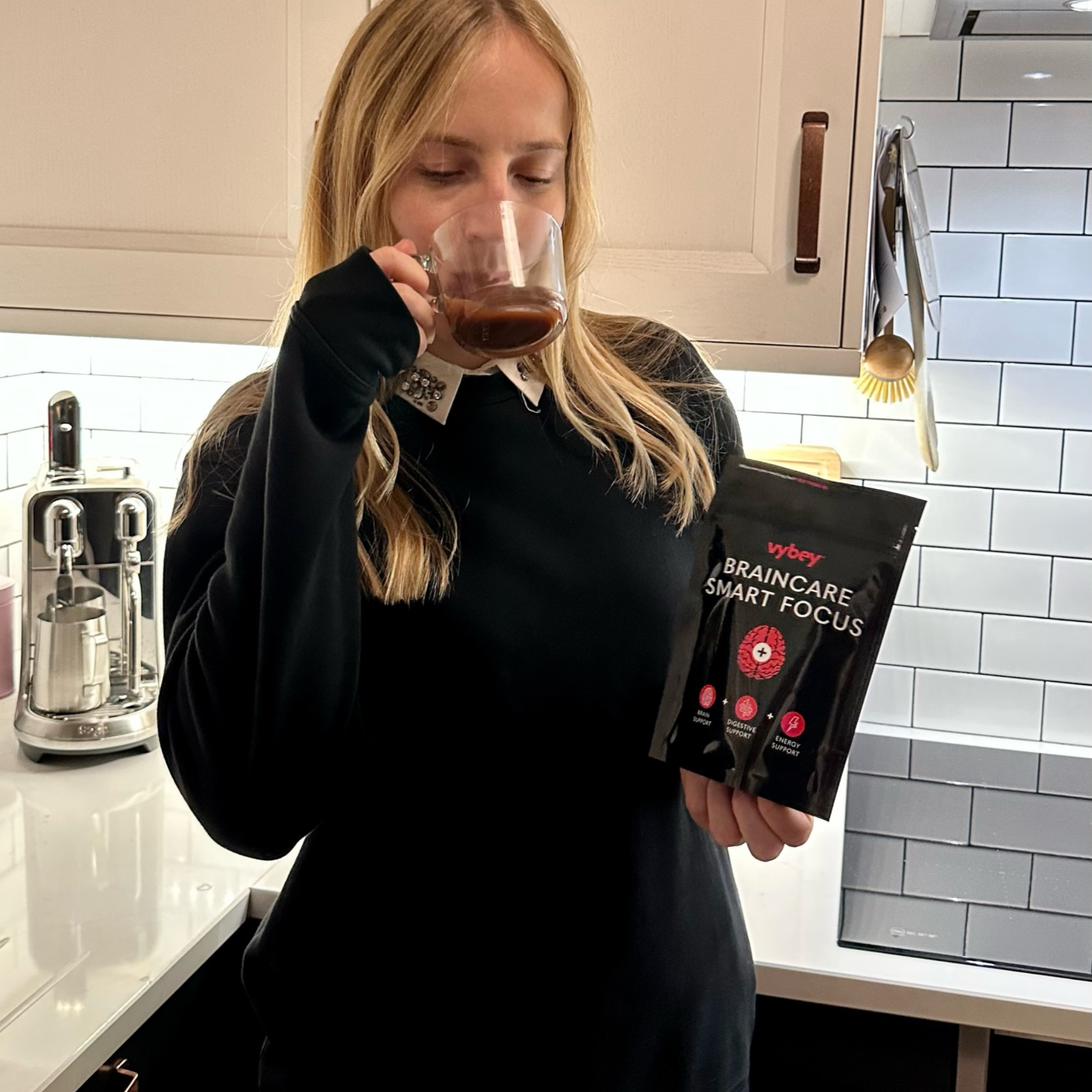Living with ADHD makes staying focused and on task incredibly difficult, even with medication, leading many people to natural remedies like L-theanine that have the potential to complement traditional treatments.
L-theanine found in green tea and some mushrooms has captured researchers' interest for its potential brain-boosting benefits as a nootropic. But is it all that?
What Is L-Theanine?
L-theanine is a natural amino acid found in tea plants that directly affects the brain's alpha frequency band to promote relaxation [1].
Unlike caffeine and other stimulants, which simply amp you up, L-theanine's effects are more nuanced. It increases alpha brain wave activity, a state associated with wakeful relaxation and increased creativity.
Calm attentiveness is the main side effect of taking L-theanine, providing enhanced focus and concentration while tamping down stress and anxiety.
The Research on L-Theanine for ADHD

Most research on L-theanine for ADHD is still in its early stages, but the initial findings are promising:
- A small 2019 study [2] found that combining L-theanine and caffeine improved sustained attention and overall cognitive performance in boys with ADHD aged 8-15.
- A 2011 study [3] in healthy adults showed that L-theanine enhanced alpha brain wave activity - a pattern associated with increased focus and concentration. Participants performed better on cognitive tasks measuring attention switching and visual processing.
- Another 2019 study [4] in healthy adults found L-theanine improved focus, self-reported calmness, and relaxation up to an hour after ingestion. It seemed to offset the transient anxiety and headache sometimes caused by caffeine.
- A randomised, double-blind, placebo-controlled clinical trial of L-theanine in boys with ADHD [5] found that 400 mg daily of L-theanine significantly improved sleep percentage, sleep efficiency, and reduced nighttime awakenings in boys aged 8-12 with ADHD, compared to placebo.
These studies suggest L-theanine may help counteract some of the core challenges of ADHD, like distractibility, restlessness, and impulsivity.
It probably achieves this by increasing the production of neurotransmitters like GABA, dopamine, and serotonin, improving mental clarity, attention, and the ability to ignore distractions.
More high-quality research is still needed, but the results are intriguing and leave open the temptation of trying L-theanine as an ADHD remedy.
Getting L-Theanine in Your Diet

vybey Braincare Smart Focus cacao flavour contains 80 mg of L-theanine per 8g serving, with additional ingredients like lion's mane, Chaga mushroom, and B vitamins to enhance your focus and improve your concentration (you can also find B vitamins in Braincare Smart Greens).
Thanks to its nootropic super-mix of natural caffeine and L-theanine, coffee can't match the focus-boosting power of vybey Braincare Smart Focus. It's flavoured with organic cacao powder and comes in cocoa and matcha flavours to suit your tastes.
However, it's important to note the distinction between our Cacao and Matcha flavours:
In our Cacao flavour, we've enriched the blend with 80 mg of L-theanine per 8g serving, thanks to the addition of natural caffeine. This combination provides a synergistic effect, enhancing your focus and concentration.
On the other hand, our Matcha variant contains natural L-theanine sourced directly from premium-grade matcha powder. Here, there's no need for additional L-theanine supplementation as the matcha powder already provides an ample dose.
But the real beauty of L-theanine is that it's relatively easy to get into your diet through foods and beverages containing green tea.
An 8-ounce cup of green tea contains approximately 25-60 mg of L-theanine, depending on the brewing method and tea quality.
If you're not a fan of green tea's somewhat grassy, bitter flavour, matcha green tea powder is another excellent source. One teaspoon of premium matcha contains around 40 mg of L-theanine. You can whisk matcha into lattes, smoothies, baked goods, and more.
Alternatively, L-theanine is widely available in capsule or tablet form, allowing you to easily control and increase the dosage if desired.
Some "nootropic" supplements also combine L-theanine with complementary brain boosters like caffeine – these can have even more positive effects on your ADHD symptoms, although caffeine can work both ways.
L-Theanine Safety and Side Effects

L-theanine from nootropic coffee drinks and green tea is extremely safe for most people because no significant side effects have been reported in clinical trials, even at larger doses of up to 800 mg. At most, some people may experience mild headaches, dizziness, or digestive issues, but these subside after a few days.
Starting with a low dose (around 50-100 mg) and seeing how you respond is best before increasing your intake. Pregnant women and children should consult a doctor before using L-theanine or any new supplement.
L-theanine seems to be well-tolerated in combination with caffeine as well. Research suggests the two compounds may have synergistic effects on attention and focus. Another potential super ingredient is lion’s mane.
Lion’s mane is thought to enhance the immune system with positive effects on sleep and mental health.
In the study of boys with ADHD looking into sleep patterns, researchers found that L-theanine was well-tolerated with no significant adverse events, suggesting its potential as a safe adjunctive therapy for sleep problems in childhood ADHD.
Other Tips for Managing ADHD Naturally

- Create routines that keep things interesting.
- Organise your time and create a to-do list.
- Start your day with a quick win, like making your bed or going for a run.
- Follow an ADHD-friendly diet focused on lean proteins, healthy fats, vegetables, fruits, and whole grains to stabilise energy and concentration
- Stay hydrated by drinking plenty of water throughout the day.
- Get regular exercise, which boosts focus-promoting brain chemicals like dopamine. Aim for a mix of cardio and strength training.
- Practice mindfulness through meditation, deep breathing, or yoga to calm your mind and enhance present-moment awareness.
- Establish good sleep habits like going to bed and waking up consistently. Sleep is crucial for regulating attention and concentration.
- Minimise clutter and potential distractions.
- Use tools like noise-cancelling headphones when you need to really zero in.
- Limit screen time to reduce your exposure to anxiety-causing news, social media, and games – read a book or do a hobby instead.
The Bottom Line
L-theanine isn't a miracle cure for ADHD, but it is a supplement worth considering - especially when combined with other lifestyle strategies.
This humble green tea compound promotes calm, focused energy without the "wired" feeling of stimulants like caffeine. According to the latest research, its safety profile is excellent, with little risk of adverse effects.
Basically, if you want to improve concentration, cognitive performance, and impulse control, L-theanine could be a valuable addition to your ADHD management plan.
vybey Braincare Smart Focus is the easiest and tastiest way to get your daily dose of L-theanine. The 80 mg serving is safe for human consumption, and you can have one or two drinks per day whenever you need a boost.
As always, discuss any new supplements with your doctor first, start low, and listen to your body's cues during supplementation.
Sources

Back to vybey blogs